外研版初中英语句子翻译复习(外研版)初一下册学习资料
- 格式:ppt
- 大小:149.00 KB
- 文档页数:26

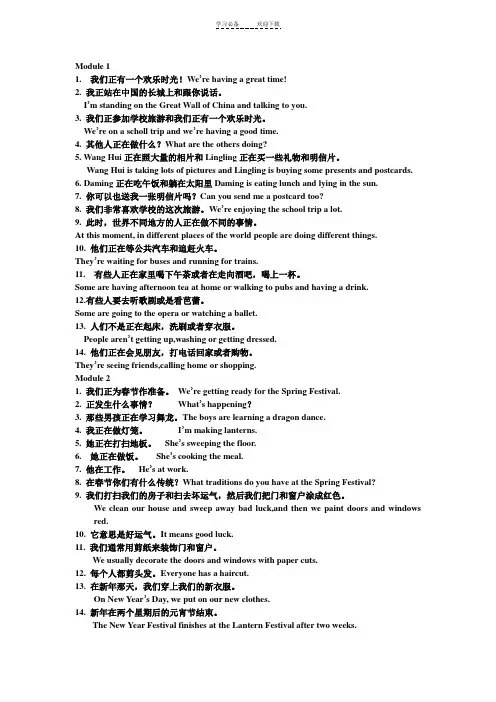
Module 11. 我们正有一个欢乐时光!We’re having a great time!2. 我正站在中国的长城上和跟你说话。
I’m standing on the Great Wall of China and talking to you.3. 我们正参加学校旅游和我们正有一个欢乐时光。
We’re on a scholl trip and we’re having a good time.4. 其他人正在做什么?What are the others doing?5. Wang Hui正在照大量的相片和Lingling正在买一些礼物和明信片。
Wang Hui is taking lots of pictures and Lingling is buying some presents and postcards.6. Daming正在吃午饭和躺在太阳里Daming is eating lunch and lying in the sun.7. 你可以也送我一张明信片吗?Can you send me a postcard too?8. 我们非常喜欢学校的这次旅游。
We’re enjoying the school trip a lot.9. 此时,世界不同地方的人正在做不同的事情。
At this moment, in different places of the world people are doing different things.10. 他们正在等公共汽车和追赶火车。
They’re waiting for buses and running for trains.11. 有些人正在家里喝下午茶或者在走向酒吧,喝上一杯。
Some are having afternoon tea at home or walking to pubs and having a drink.12.有些人要去听歌剧或是看芭蕾。
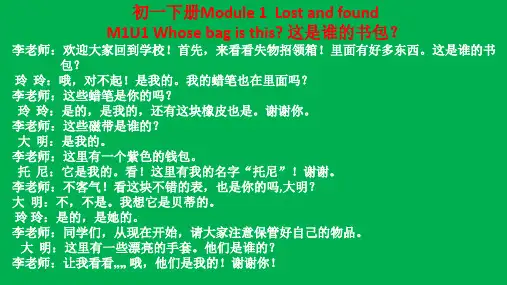
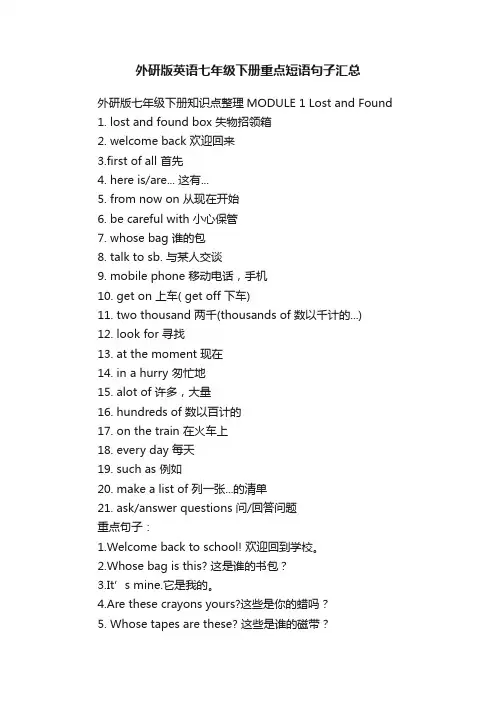
外研版英语七年级下册重点短语句子汇总外研版七年级下册知识点整理MODULE 1 Lost and Found1. lost and found box 失物招领箱2. welcome back 欢迎回来3.first of all 首先4. here is/are... 这有...5. from now on 从现在开始6. be careful with 小心保管7. whose bag 谁的包8. talk to sb. 与某人交谈9. mobile phone 移动电话,手机10. get on 上车( get off 下车)11. two thousand 两千(thousands of 数以千计的...)12. look for 寻找13. at the moment 现在14. in a hurry 匆忙地15. alot of 许多,大量16. hundreds of 数以百计的17. on the train 在火车上18. every day 每天19. such as 例如20. make a list of 列一张...的清单21. ask/answer questions 问/回答问题重点句子:1.Welcome back to school! 欢迎回到学校。
2.Whose bag is this? 这是谁的书包?3.It’s mine.它是我的。
4.Are these crayons yours?这些是你的蜡吗?5. Whose tapes are these? 这些是谁的磁带?6. Here’s a purple wallet!这儿有个紫色钱包。
7. I think it’s Betty’s. Lingling. 认为它是玲玲的。
8. Everyone, please be careful with your things from now on.请大家从今以后仔细对待你们的东西。
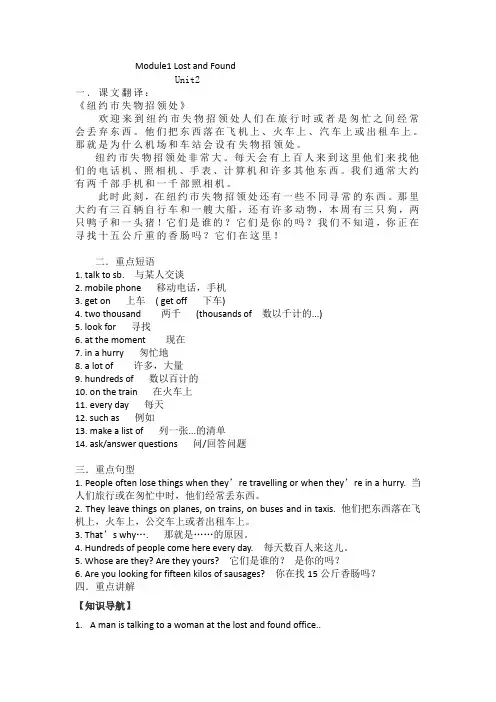
Module1 Lost and FoundUnit2一.课文翻译:《纽约市失物招领处》欢迎来到纽约市失物招领处人们在旅行时或者是匆忙之间经常会丢弃东西。
他们把东西落在飞机上、火车上、汽车上或出租车上。
那就是为什么机场和车站会设有失物招领处。
纽约市失物招领处非常大。
每天会有上百人来到这里他们来找他们的电话机、照相机、手表、计算机和许多其他东西。
我们通常大约有两千部手机和一千部照相机。
此时此刻,在纽约市失物招领处还有一些不同寻常的东西。
那里大约有三百辆自行车和一艘大船,还有许多动物,本周有三只狗,两只鸭子和一头猪!它们是谁的?它们是你的吗?我们不知道,你正在寻找十五公斤重的香肠吗?它们在这里!二.重点短语1. talk to sb. 与某人交谈2. mobile phone 移动电话,手机3. get on 上车( get off 下车)4. two thousand 两千(thousands of 数以千计的...)5. look for 寻找6. at the moment 现在7. in a hurry 匆忙地8. a lot of 许多,大量9. hundreds of 数以百计的10. on the train 在火车上11. every day 每天12. such as 例如13. make a list of 列一张...的清单14. ask/answer questions 问/回答问题三.重点句型1. People often lose things when they’re travelling or when they’re in a hurry. 当人们旅行或在匆忙中时,他们经常丢东西。
2. They leave things on planes, on trains, on buses and in taxis. 他们把东西落在飞机上,火车上,公交车上或者出租车上。
3. That’s why…. 那就是……的原因。
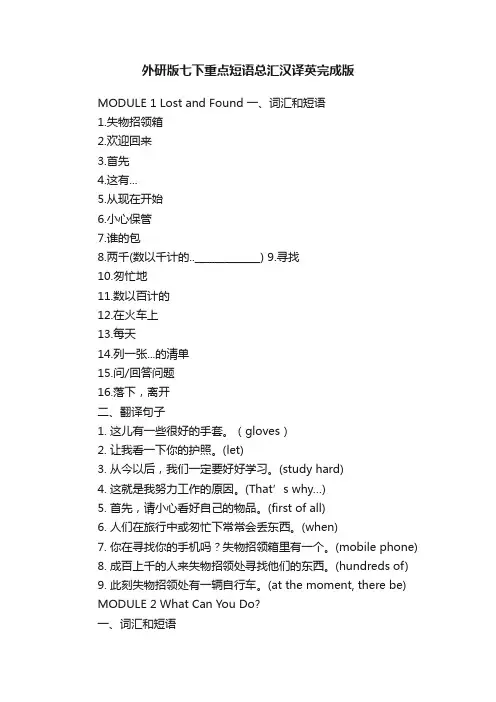
外研版七下重点短语总汇汉译英完成版MODULE 1 Lost and Found 一、词汇和短语1.失物招领箱2.欢迎回来3.首先4.这有...5.从现在开始6.小心保管7.谁的包8.两千(数以千计的.._____________) 9.寻找10.匆忙地11.数以百计的12.在火车上13.每天14.列一张...的清单15.问/回答问题16.落下,离开二、翻译句子1. 这儿有一些很好的手套。
(gloves)2. 让我看一下你的护照。
(let)3. 从今以后,我们一定要好好学习。
(study hard)4. 这就是我努力工作的原因。
(That’s why…)5. 首先,请小心看好自己的物品。
(first of all)6. 人们在旅行中或匆忙下常常会丢东西。
(when)7. 你在寻找你的手机吗?失物招领箱里有一个。
(mobile phone)8. 成百上千的人来失物招领处寻找他们的东西。
(hundreds of)9. 此刻失物招领处有一辆自行车。
(at the moment, there be) MODULE 2 What Can You Do?一、词汇和短语2.打乒乓球3.骑自行车4.说汉语5.担心6.踢足球7.音乐俱乐部8.与某人相处融洽9.在校队10.学习非常努力11.确信的12.准备做某事13.使我们的教室漂亮14.放风筝15.游泳游的好16.制作海报17.教,教书18.承诺,保证二、翻译句子1. 我和同学们相处得非常融洽。
(classmates)2. 玲玲跳舞跳得很好。
(Lingling can…)3. 她乐于助人。
(always)4. 他们能教他英语。
( teach )5. 大明经常帮助妈妈打扫房间。
(tidy house)6. 我们能把教室变漂亮。
(make)7. 他保证在新的一年多做一些运动。
(promise)8. 他喜欢跳舞所以他想加入舞蹈社团。
(join) MODULE 3 Making Plans 一、词汇和短语1.复习功课2.看电影3.帮忙做家务5.野餐6.在周六上午7.加入到我们中来8.独自待在家里9.盼望某事/做某事10.起床晚/早11.煞夜12.过得愉快13.玩得愉快14.五一劳动节15.在五月二日16.去游泳17.散步18.收集垃圾19.观光20.去散步21.与某人交朋友22.在家23.去夏令营24.在海滩上25.听音乐26.环游世界27.待在床上28.一个篮球迷29.与家人和朋友们一起度过时光二、翻译句子1. 该做晚饭了。
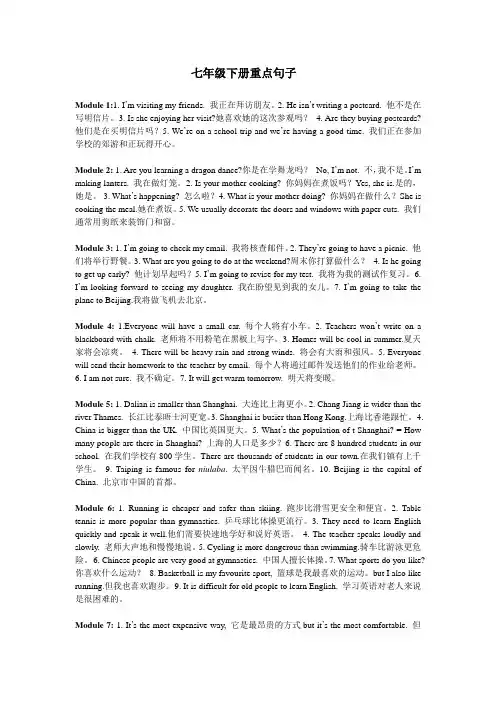
七年级下册重点句子Module 1:1. I’m visiting my friends. 我正在拜访朋友。
2. He isn’t writing a postcard. 他不是在写明信片。
3. Is she enjoying her visit?她喜欢她的这次参观吗? 4. Are they buying postcards? 他们是在买明信片吗?5. We’re on a school trip and we’re having a good time. 我们正在参加学校的郊游和正玩得开心。
Module 2: 1. Are you learning a dragon dance?你是在学舞龙吗?No, I’m not. 不,我不是。
I’m making lanters. 我在做灯笼。
2. Is your mother cooking? 你妈妈在煮饭吗?Yes, she is.是的,她是。
3. What’s happening? 怎么啦?4. What is your mother doing? 你妈妈在做什么?She is cooking the meal.她在煮饭。
5. We usually decorate the doors and windows with paper cuts. 我们通常用剪纸来装饰门和窗。
Module 3: 1. I’m going to check my email. 我将核查邮件。
2. They’re going to have a picnic. 他们将举行野餐。
3. What are you going to do at the weekend?周末你打算做什么?4. Is he going to get up early? 他计划早起吗?5. I’m going to revise for my test. 我将为我的测试作复习。
6. I’m looking forward to seeing my daughter. 我在盼望见到我的女儿。
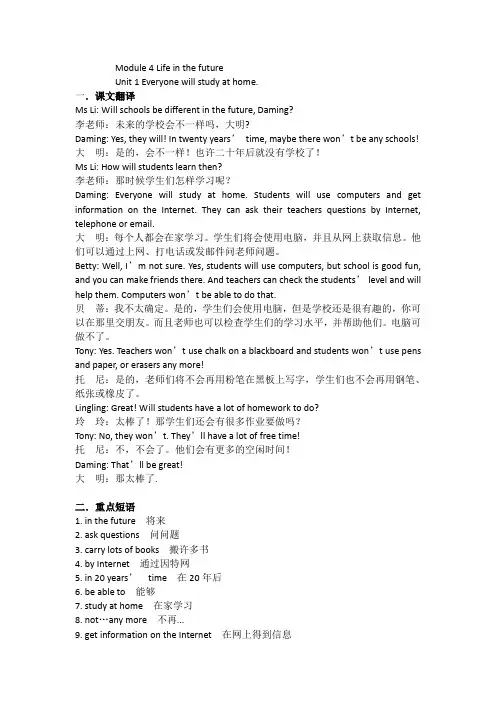
Module 4 Life in the futureUnit 1 Everyone will study at home.一.课文翻译Ms Li: Will schools be different in the future, Daming?李老师:未来的学校会不一样吗,大明?Daming: Yes, they will! In twenty years’time, maybe there won’t be any schools! 大明:是的,会不一样!也许二十年后就没有学校了!Ms Li: How will students learn then?李老师:那时候学生们怎样学习呢?Daming: Everyone will study at home. Students will use computers and get information on the Internet. They can ask their teachers questions by Internet, telephone or email.大明:每个人都会在家学习。
学生们将会使用电脑,并且从网上获取信息。
他们可以通过上网、打电话或发邮件问老师问题。
Betty: Well, I’m not sure. Yes, students will use computers, but school is good fun, and you can make friends there. And teachers can check the students’level and will help them. Computers won’t be able to do that.贝蒂:我不太确定。
是的,学生们会使用电脑,但是学校还是很有趣的,你可以在那里交朋友。
而且老师也可以检查学生们的学习水平,并帮助他们。
电脑可做不了。
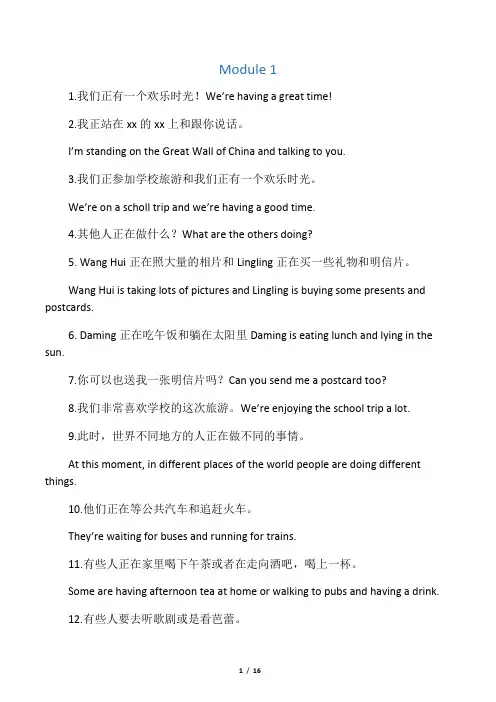
Module 11.我们正有一个欢乐时光!We’re having a great time!2.我正站在xx的xx上和跟你说话。
I’m standing on the Great Wall of China and talking to you.3.我们正参加学校旅游和我们正有一个欢乐时光。
We’re on a scholl trip and we’re having a good time.4.其他人正在做什么?What are the others doing?5. Wang Hui正在照大量的相片和Lingling正在买一些礼物和明信片。
Wang Hui is taking lots of pictures and Lingling is buying some presents and postcards.6. Daming正在吃午饭和躺在太阳里Daming is eating lunch and lying in the sun.7.你可以也送我一张明信片吗?Can you send me a postcard too?8.我们非常喜欢学校的这次旅游。
We’re enjoying the school trip a lot.9.此时,世界不同地方的人正在做不同的事情。
At this moment, in different places of the world people are doing different things.10.他们正在等公共汽车和追赶火车。
They’re waiting for buses and run ning for trains.11.有些人正在家里喝下午茶或者在走向酒吧,喝上一杯。
Some are having afternoon tea at home or walking to pubs and having a drink.12.有些人要去听歌剧或是看芭蕾。
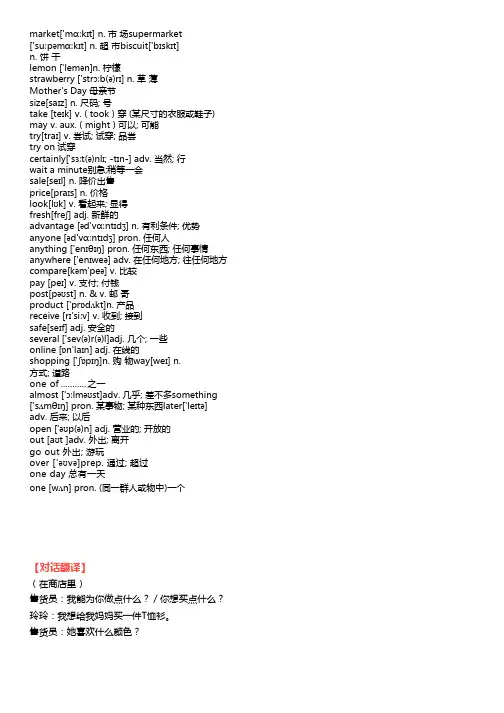
market['mɑːkɪt] n. 市场supermarket['suːpəmɑːkɪt] n. 超市biscuit['bɪskɪt]n. 饼干lemon ['lemən]n. 柠檬strawberry ['strɔːb(ə)rɪ] n. 草薄Mother's Day 母亲节size[saɪz] n. 尺码; 号take [teɪk] v. ( took ) 穿 (某尺寸的衣服或鞋子) may v. aux. ( might ) 可以; 可能try[traɪ] v. 尝试; 试穿; 品尝try on 试穿certainly['sɜːt(ə)nlɪ; -tɪn-] adv. 当然; 行wait a minute别急;稍等一会sale[seɪl] n. 降价出售price[praɪs] n. 价格look[lʊk] v. 看起来; 显得fresh[freʃ] adj. 新鲜的advantage [əd'vɑːntɪdʒ] n. 有利条件; 优势anyone [əd'vɑːntɪdʒ] pron. 任何人anything ['enɪθɪŋ] pron. 任何东西; 任何事情anywhere ['enɪweə] adv. 在任何地方; 往任何地方compare[kəm'peə] v. 比较pay [peɪ] v. 支付; 付钱post[pəʊst] n. & v. 邮寄product ['prɒdʌkt]n. 产品receive [rɪ'siːv] v. 收到; 接到safe[seɪf] adj. 安全的several ['sev(ə)r(ə)l]adj. 几个; 一些online [ɒn'laɪn] adj. 在线的shopping ['ʃɒpɪŋ]n. 购物way[weɪ] n.方式; 道路one of ........... 之一almost ['ɔːlməʊst]adv. 几乎; 差不多something ['sʌmθɪŋ] pron. 某事物; 某种东西later['leɪtə] adv. 后来; 以后open ['əʊp(ə)n] adj. 营业的; 开放的out [aʊt ]adv. 外出; 离开go out 外出; 游玩over ['əʊvə]prep. 通过; 超过one day 总有一天one [wʌn] pron. (同一群人或物中)一个【对话翻译】(在商店里)售货员:我能为你做点什么?/你想买点什么?玲玲:我想给我妈妈买一件T恤衫。
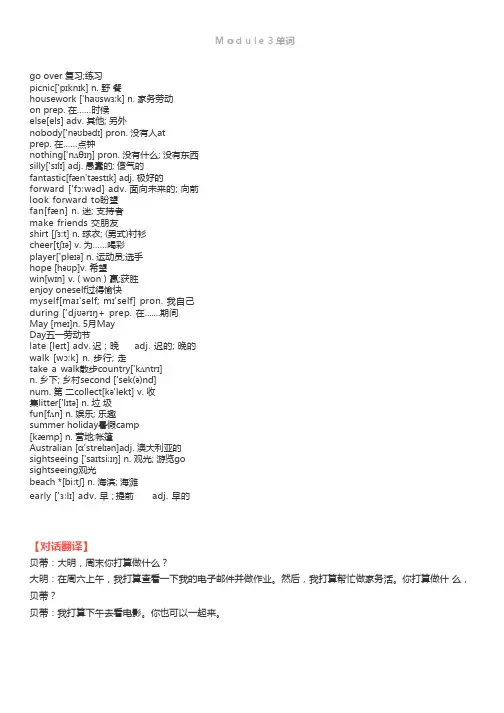
M o d u l e 3 单词go over 复习;练习picnic['pɪknɪk] n. 野餐housework ['haʊswɜːk] n. 家务劳动on prep. 在……时候else[els] adv. 其他; 另外nobody['nəʊbədɪ] pron. 没有人atprep. 在……点钟nothing['nʌθɪŋ] pron. 没有什么; 没有东西silly['sɪlɪ] adj. 愚蠢的; 傻气的fantastic[fæn'tæstɪk] adj. 极好的forward ['fɔːwəd] adv. 面向未来的; 向前look forward to盼望fan[fæn] n. 迷; 支持者make friends 交朋友shirt [ʃɜːt] n. 球衣; (男式)衬衫cheer[tʃɪə] v. 为……喝彩player['pleɪə] n. 运动员;选手hope [həʊp]v. 希望win[wɪn] v. ( won ) 赢;获胜enjoy oneself过得愉快myself[maɪ'self; mɪ'self] pron. 我自己during ['djʊərɪŋ+prep. 在.......期间May [meɪ]n. 5月MayDay五一劳动节late [leɪt] adv. 迟 ; 晚adj. 迟的; 晚的walk [wɔːk] n. 步行; 走take a walk散步country['kʌntrɪ]n. 乡下; 乡村second ['sek(ə)nd]num. 第二collect[kə'lekt] v. 收集litter['lɪtə] n. 垃圾fun[fʌn] n. 娱乐; 乐趣summer holiday暑假camp[kæmp] n. 营地;帐篷Australian [ɑ'strelɪən]adj. 澳大利亚的sightseeing ['saɪtsiːɪŋ] n. 观光; 游览gosightseeing观光beach *[biːtʃ] n. 海滨; 海滩early ['ɜːlɪ] adv. 早 ; 提前adj. 早的【对话翻译】贝蒂:大明,周末你打算做什么?大明:在周六上午,我打算查看一下我的电子邮件并做作业。
MODULE 1 Lost and Found 一、词汇和短语1.失物招领箱2.欢迎回来3.首先4.这有...5.从现在开始6.小心保管7.谁的包8.两千(数以千计的.._____________) 9.寻找10.匆忙地11.数以百计的12.在火车上13.每天14.列一张...的清单15.问/回答问题16.落下,离开二、翻译句子1. 这儿有一些很好的手套。
(gloves)2. 让我看一下你的护照。
(let)3. 从今以后,我们一定要好好学习。
(study hard)4. 这就是我努力工作的原因。
(That’s why…)5. 首先,请小心看好自己的物品。
(first of all)6. 人们在旅行中或匆忙下常常会丢东西。
(when)7. 你在寻找你的手机吗?失物招领箱里有一个。
(mobile phone)8. 成百上千的人来失物招领处寻找他们的东西。
(hundreds of)9. 此刻失物招领处有一辆自行车。
(at the moment, there be)MODULE 2 What Can You Do?一、词汇和短语1.弹钢琴2.打乒乓球3.骑自行车4.说汉语5.担心6.踢足球7.音乐俱乐部8.与某人相处融洽9.在校队10.学习非常努力11.确信的12.准备做某事13.使我们的教室漂亮14.放风筝15.游泳游的好16.制作海报17.教,教书18.承诺,保证二、翻译句子1. 我和同学们相处得非常融洽。
(classmates)2. 玲玲跳舞跳得很好。
(Lingling can…)3. 她乐于助人。
(always)4. 他们能教他英语。
( teach )5. 大明经常帮助妈妈打扫房间。
(tidy house)6. 我们能把教室变漂亮。
(make)7. 他保证在新的一年多做一些运动。
(promise)8. 他喜欢跳舞所以他想加入舞蹈社团。
(join)MODULE 3 Making Plans 一、词汇和短语1.复习功课2.看电影3.帮忙做家务4.上钢琴课5.野餐6.在周六上午7.加入到我们中来8.独自待在家里9.盼望某事/做某事10.起床晚/早11.煞夜12.过得愉快13.玩得愉快14.五一劳动节15.在五月二日16.去游泳17.散步18.收集垃圾19.观光20.去散步21.与某人交朋友22.在家23.去夏令营24.在海滩上25.听音乐26.环游世界27.待在床上28.一个篮球迷29.与家人和朋友们一起度过时光二、翻译句子1. 该做晚饭了。
初中英语(外研社版) 7年级(下)语法词汇复习讲义Module 1 People and places话题:Talking about people and places(be doing 特问、一般)重点单词:8:00重点句子,考点出处(背诵):1.I’m standing on the Great Wall of China and talking to you.2.We’re enjoying the school trip a lot.3.Please send a card to Grandma!4.We’re standing in front of Madonna’s home and writing this postcard to you.5.We’re looking at the homes of the film stars.6. How are you?7. See you soon.8. Finish like this.练习:1. Let help you. A. I B. me C. my D. mine2. What Tom reading? A. am B. is C. are D. does3. Mary in our school? A. Is, work B. Are, working C. Do, work D. Does, work4. They tennis now. A. play B. are playing C. played D. plays5. there a bank near here? A. Are B. Is C. Am D. Be6. Jack enjoys football after school. A. plays B. to play C. playing D. play7. --Your mother is waiting for you outside the school gate.-- . A. That’s Ok. B. Really? C. It doesn’t matter. D. Sorry8. Please this book to the classroom. A. take B. bring C. carry D. buy9. He often gets up and at 6:00 in the morning.10. It’s very cold; he finds his cap and . A. put on B. put on it C. puts it on D. put it on11. Be quiet! The baby . A. is sleeping B. is sleeping C. sleep D. sleeped12. –What are you doing?-- . A. I’m writing B. I’m a student C. I’m from Nanning D. I’m Tom13. --Does she often go to see her grandparents?-- . A. Yes, she is B. Yes, she does C. Yes, she do D. Yes, she are14. –Is the man running in the street?-- . A. Yes, he is B. Yes, he does C. Yes, he do D. Yes, he are15. The Blacks are their car to go travelling. A. drives B. driving C. to driving D. drived 每天读本章课文三遍,请家长配合检查,谢谢!Module 2 Spring Festival话题:Talking about spring festival(be doing 答问)重点词组句型:1.一些学生正在擦桌子,另一些在擦椅子。
bank*[bæŋk] n. 银行museum [mju'zi:əm] n. 博物馆along [ə'lɔŋ] prep. 沿着across[ə'krɔs] prep.越过cross [krɔs] v.穿过opposite ['ɔpəzit] prep. 在……的对面tourist ['tʊərist] n. 游客excuse [ik'skju:s] v. 原谅; 谅解excuse me 劳驾,对不起(用于礼貌地引起某人的注意)street [stri:t] n. 街道turn [tə:n] v. 换方向third*[θɜ:d] num. 第三guidebook ['gaidbʊk] n. 导游手册; 旅行指南bookshop ['bʊkʃɒp] n. 书店right int. 好了(用于变换话题或活动); 是的; 好Why not...? 为什么不……呢?could [kəd] v. aux. 可以; 能underground *[ˌʌndə'ɡraʊnd] n. 地铁take[teik] v. 搭乘; 乘坐; 固定使用; 把(某人)带往; 使(某人)到tour [tuə] n. (短期的)参观,游览; 旅行square*[skweə(r)] n. 广场middle ['midl] n. 中部; 中间 adj.中等的; 中部的famous*['feiməs] adj. 著名的painting*['peintiŋ] n.油画; 绘画from*[ frəm] prep. 从……出发metre ['mi:tə(r)] (AmE meter) n. 米above[ə'bʌv] prep. 在……上方; 在……之上river* ['rivə(r)] n. 河 ; 江clear* [kliə(r)] adj. (天气)晴朗的bridge [bridʒ] n. 桥railway ['reilwei] n. 铁路past [pɑ:st] prep. 路过(某物或某地);越过church [tʃɜ:tʃ] n. 教堂finish ['finiʃ] v. 结束; 完成high [hai] adj. 高的post office [pəust 'ɔfis] 邮政局up [ʌp] prep. 沿着...... 而去.down [daʊn] prep. 沿着stop [stɔp] n. 车站【对话翻译】(贝蒂和玲玲正站在天安门广场前面。
七年级下册知识点英语外研版翻译As a student of the seventh grade, you are expected to acquire knowledge in various subjects. In English, you will need to learn different grammar structures, vocabulary, and expressions. Here are some essential knowledge points for the second semester of the seventh grade, which will be useful for you in your future English studies.1. Past Simple TenseThe past simple tense is used to describe an action that happened at a specific time in the past. The pattern for forming the past simple tense is to add “-ed” to the base form of regular verbs. For irregular verbs, you need to memorize their past tense forms. For example, the past simple tense of “eat” is “ate”.2. Modal VerbsModal verbs are auxiliary verbs that express modality, which refers to the degree of possibility, probability, or necessity of an event. The most common modal verbs are “can”, “could”, “may”, “might”, “must”, “shall”, “should”, “will”, and “would”. They can be used to expressdifferent meanings and functions, such as ability, permission, obligation, advice, suggestion, prediction, etc.3. AdjectivesAdjectives are words that describe or modify nouns or pronouns. They can express different qualities, such as size, shape, color, texture, personality, etc. Adjectives can be placed before or after the nouns they modify. When there are multiple adjectives that modify the same noun, they usually follow a specific order: opinion – size – age – shape –color – origin – material – purpose.4. Present Continuous TenseThe present continuous tense is used to describe an action that is happening at the moment of speaking, or is in progress around the time of speaking. The pattern for forming the present continuous tense is to add “-ing” to the base form of verbs, and to use the appropriate form of the auxiliary verb “to be”. For example, “I am eating a sandwich” or “He is reading a book”.5. PrepositionsPrepositions are words that show the relationship between a noun or pronoun and other words in a sentence. Common prepositions include “at”, “in”, “on”, “to”, “by”, “with”, “for”, “from”, “until”, “since”, “before”, “after”, etc. Prepositions can indicate location, time, cause, manner, etc.6. Comparatives and SuperlativesComparatives and superlatives are forms of adjectives or adverbs that express the degree of comparison between two or more things. The comparative form is used to compare two things, and the superlative form is used to compare more than two things. The pattern for forming comparatives is to add “-er” to short adjectives, and to use “more” with long adjectives. The pattern for forming superlatives is to add “-est” to short adjectives, and to use “most” with long adjectives.7. Reported SpeechReported speech, also known as indirect speech, is used to report what someone else said, without using their exact words. The structure of reported speech usually involves: a reporting verb (such as “said” or “asked”), a reporting clause (such as “that” or “if”), a subject (usuallychanged to match the reporting verb), and a verb (usually changed to match the tense in the reporting clause). For example, “She said that she was going to the store”.These knowledge points are just the tip of the iceberg in your English studies. By mastering them, you will be able to communicate more effectively and confidently in English, and prepare yourself for more advanced language skills in the future.。
[英语学习]外研社初一下句子翻译M11. 托尼正在写明信片。
Tony is writing __________.2. 王慧正在和她妈妈谈话。
Wang Hui is ______________ her mother.3.李明正在看电视。
Li Ming is __________________.4. 我非常喜欢吃热狗。
I like eating _____________ very much.5. 我爸爸现在不在家。
My father isn’t ____________ .6. 无论如何,我们马上就回家了。
__________, we’re ______________________ now. 7. 别的人在做什么,_________ are the ______________________? 8. 我们正在听老师讲。
We ______ ____________ _______ the teacher. 9. —我弟弟在做什么,___________ __________ your brother____________?—他正在跑步。
He __________ ______________.10. 王辉在拍许多的照片,玲玲在买礼物和明信片。
Wang Hui ______________ _______ ____ _________ and Lingling ___ _________ some _______ and ________. 11. 人们没在穿衣打扮。
People _________ ____________________. 12. 一些人要去听歌剧或看芭蕾舞表演。
Some are ___________________ __________ ____________ or ___________ _________.13. 你能发送给我一张明信片吗,________ you _______ _______ _________ ________? 14. 他们正在家或餐厅里吃饭。